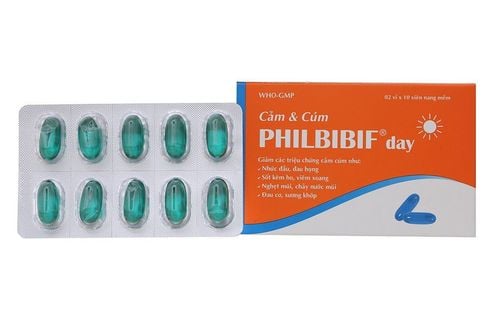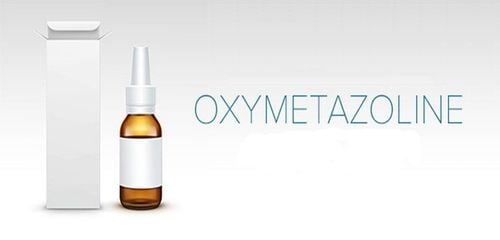This is an automatically translated article.
Deconal drug has the main ingredients Paracetamol and Pseudoephedrine. Deconal is indicated for the treatment of symptoms of the common cold, exudative mucositis, sinusitis and disorders of the upper respiratory tract.
1. What is Deconal?
Deconal drug has the main ingredients: Paracetamol 500mg and Pseudoephedrine HCl 30mg. Paracetamol is the active metabolite of Phenacetin, is an effective analgesic and antipyretic, however, Paracetamol is not effective in the treatment of inflammation. In equal doses in grams, Paracetamol has analgesic and antipyretic effects similar to Aspirin. Paracetamol with therapeutic doses has little impact on cardiovascular and respiratory, does not change acid-base balance, does not cause irritation or gastric bleeding because Paracetamol does not affect systemic cyclooxygenase, only affects cyclooxygenase/ prostaglandins of the central nervous system.
Active ingredient Pseudoephedrine is a sympathomimetic agent used to treat nasal congestion. Phenylpropanolamine is an agonist of alpha-adrenergic receptors that produces vasoconstriction, relieves symptoms of nasal edema and congestion, and increases nasal ventilation. Phenylpropanolamine may indirectly stimulate beta receptors, causing tachycardia.
2. Indications of Deconal
Deconal is indicated in the treatment of symptoms of the common cold, exudative mucositis, sinusitis and disorders of the upper respiratory tract. Deconal is contraindicated in the following cases:Severe liver and kidney disease. Patients with glucose-6-phosphate dehydrogenase deficiency. Do not use the drug in patients who are hypersensitive to the action of the active substance or to any of its components.
3. Dosage of Deconal
Deconal is taken orally. Patients can take the drug with or without meals. Reference dose is as follows:
Adults and children from 12 years of age and older: It is recommended to take 1-2 tablets/time. If necessary, can be repeated after 4-6 hours, up to a maximum of 8 tablets divided 4 times a day. Children from 7 to 12 years: Recommended to take 1 tablet / time. If necessary, can be repeated after 4-6 hours, up to a maximum of 4 tablets / day. Patients should not use this medicine together with other preparations containing Paracetamol.
4. What are the side effects of Deconal?
Deconal side effects are usually mild, transient, and include gastrointestinal disturbances, skin rashes, and allergic reactions. In some cases, patients may experience neutropenia/thrombocytopenia and pancytopenia. The drug can also cause central nervous system stimulation, especially in patients sensitive to sympathomimetic agents. Patients should inform their doctor of any side effects encountered while taking the drug.
5. Notes when using Deconal
Patients should use Decanal with caution in the following cases: Liver and kidney disease; alcoholism (because Paracetamol and alcohol are both harmful to the liver); in combination with other preparations containing Paracetamol because it may cause overdose or drug poisoning. Physicians should warn patients about the signs of serious skin reactions such as: Stevens-Johnson syndrome (SJS), toxic skin necrosis syndrome (TEN), Lyell's syndrome, or generalized pustular rash acute (AGEP). When signs of skin rash or any other signs of hypersensitivity reaction are detected, the patient should stop using Deconal immediately. People who have experienced severe skin reactions caused by Paracetamol should not use the drug again and when going to the doctor, they need to notify the medical staff. To avoid the risk of liver damage from Deconal, patients should avoid alcohol during treatment with this medicine. Deconal may decrease a user's ability to concentrate or react. Therefore, caution should be exercised if you are driving or performing tasks that require concentration and alertness. Use Deconal with caution in patients with untreated or uncontrolled medical conditions such as: glaucoma, heart disease, COPD, high blood pressure, asthma, coronary artery disease. Convulsive disorders: Caution should be exercised when administering the drug to patients with seizure disorders because of possible CNS stimulation. Thyroid dysfunction: Use Deconal with caution in patients with thyroid dysfunction. Elderly: Use Deconal with caution in the elderly as they may be more sensitive to side effects Pregnancy: Human and animal studies have not identified a risk of Paracetamol. for pregnancy and embryonic development. Use of Pseudoephedrine during the first trimester may increase the risk of birth defects, possibly due to a vasoconstrictor effect; however, additional studies are needed. It is best to avoid taking Pseudoephedrine during the first trimester. Lactation: Paracetamol and Pseudoephedrine are excreted in human milk. Infants and mothers should be monitored for possible side effects such as arrhythmia, insomnia, irritability, restlessness or tachycardia. Because acute reduction in milk production can occur with Pseudoephedrine, some patients may require a single dose, others may require scheduled dosing to limit the effect on milk production.
6. Drug interactions
Concomitant use of Deconal with some drugs may cause interactions, affect the therapeutic effect and/or increase toxicity. It is best for patients to inform their doctors of all medications and supplements they are taking for advice. Here are some drug interactions of Deconal to note when using:
Long-term and high-dose use of Paracetamol with anticoagulants such as Coumarin and Indandion derivatives may slightly increase the effect of anticoagulants. Paracetamol can cause strong antipyretic in patients when co-administered with phenothiazines or antipyretic therapy. Deconal should not be used in patients who have taken or have been taking MAO inhibitors in the past 14 days because of the potential for dangerous drug interactions. Some drugs when taken with Paracetamol increase the risk of hepatotoxicity, including anticonvulsants such as Phenytoin, Carbamazepine and the anti-tuberculosis drug Isoniazid. Therefore, patients should limit the use of Paracetamol while taking these drugs. Alkalizing urine with sodium bicarbonate or other urine alkalinizing drugs can cause a buildup of Pseudoephedrine in the body and lead to symptoms of toxicity such as anxiety, insomnia, and tachycardia. In addition, acidification of urine with ammonium chloride may have the opposite effect. Above is information about uses, uses and dosages of Deconal. If you have questions or need more information about your medication, you should contact your doctor or pharmacist for advice.













